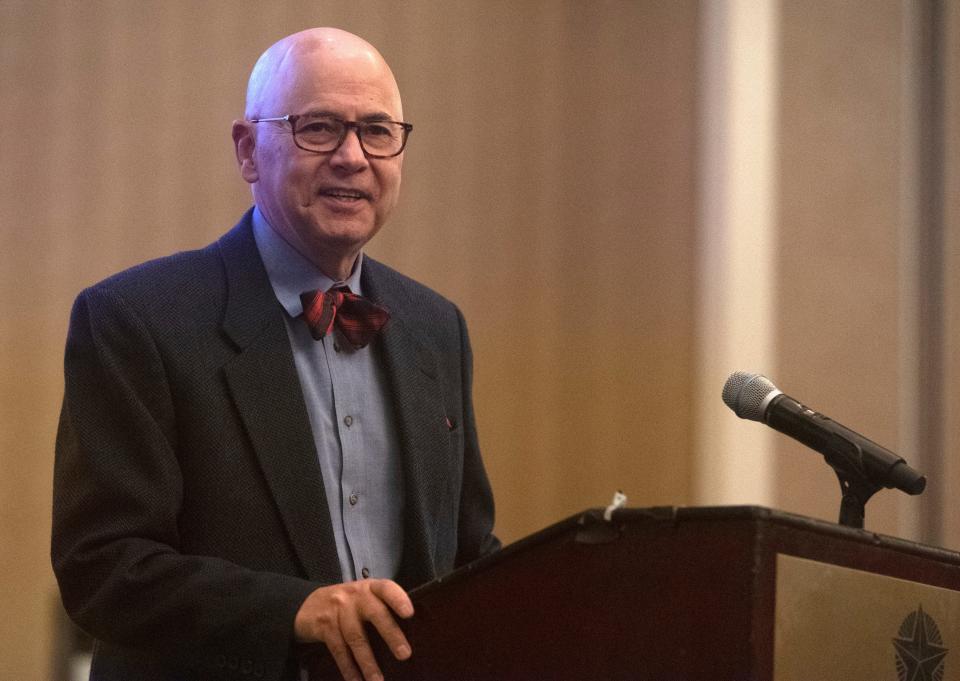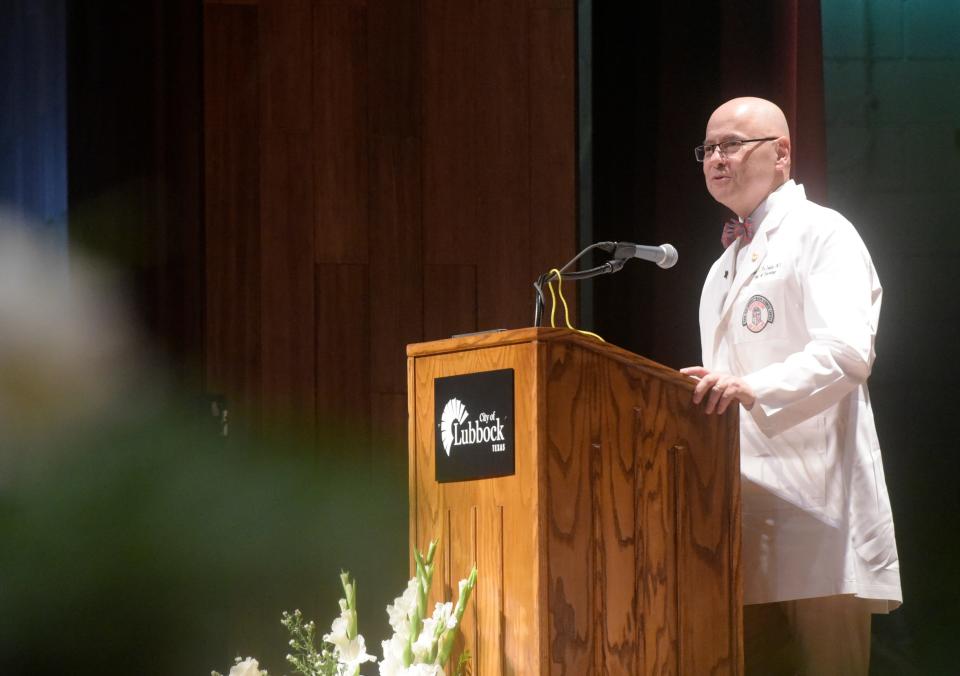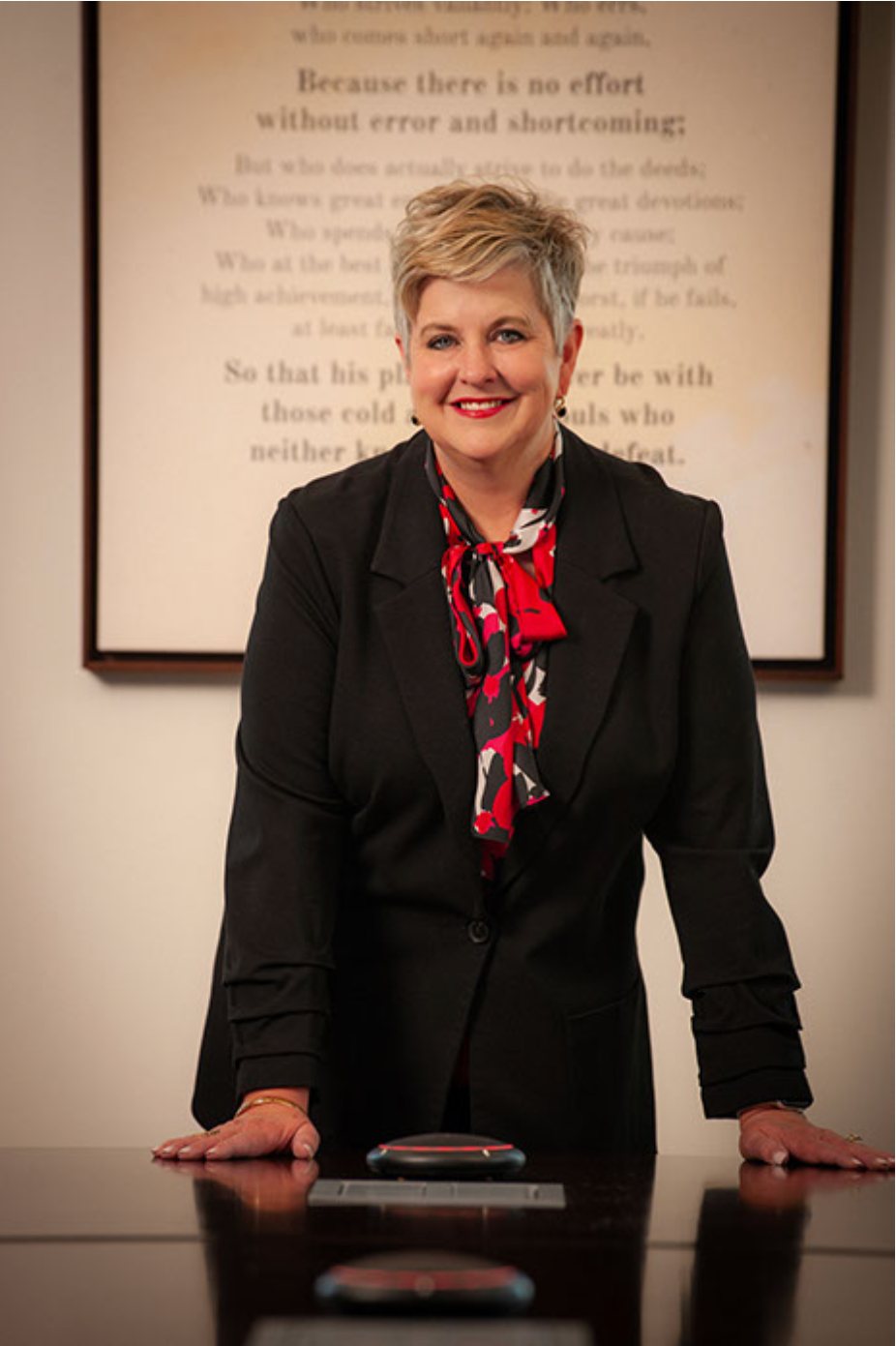'Taking care of our own': New TTUHSC dean shares goals, talks future of medical school
Traveling to the second floor of the Texas Tech University Health Sciences Center's original building, one will find the dean of the School of Medicine's office. It's a space that has a history of housing both deans and presidents of the university and now welcomes its newest occupant.
Having been named dean and executive vice president of the TTUHSC in February, Dr. John DeToledo's office sits bare except for a few knickknacks scattered throughout the space — a reflection of the humble and soft-spoken occupant.

Before being named to his new position, DeToledo's journey in medicine started decades ago, 5,359 miles south of Lubbock.
Journey from Brazil to Lubbock
DeToledo is a native of São Paulo, Brazil and comes from a long line of family physicians. He said it was only natural for him to attend São Paulo Medical School. He graduated in 1980 but didn't stay there for his residency training. Instead, he moved to Boston.
"I was an exchange student when I was 15 and I lived with a wonderful family in Michigan and I really enjoyed the experience," he said of his previous experience in the United States. "Specializing in this country would open doors for me ... I would not have that same kind of opportunity if I stayed in Brazil for my specialty training."
Gaining a spot at Columbia University for internal medicine, DeToledo crossed paths with his future predecessor — Dr. Steven Berk, who at the time was a doctor in Boston.
It was also during this time that DeToledo said he switched specialties from internal medicine to neurology.
"Neurology is rarely a love at first sight," he said. "Neurology, more often than not, is an acquired taste."
DeToledo said that 3% to 5% of a medical school students have an interest in neurology, which usually stems from undergraduate work done in the field. However, for him, it was different.
"There are some of us that they start in medicine and they find an affinity with the disease of the central nervous system and it's almost as if it clicks," he said. "It becomes effortless to make those connections."
Having switched fields, DeToledo gained additional training at Boston University and the Boston City Hospital and went on to complete his fellowship in epilepsy and neurophysiology at the Oregon Comprehensive Epilepsy Program.
Following his fellowship, DeToledo stayed as the Cornelia Wheeler division chief of Epilepsy until 1992, when his adventure took him to the nation's capital.
"I came to George Washington (University) as a junior professor," he said.
While in Washington, D.C., DeToledo ultimately became the chief of the Division of Epilepsy and Neurophysiology and the Neurology Residency Program Director at WGU, but his adventures were about to go abroad once more.
"I was invited to work in Saudi Arabia - in Riyadh - with King Faisal hospital," he said.
During his six-month stint there, DeToledo helped establish the Epilepsy Program at the King Faisal Specialist Hospital. He returned to the United States to serve as the co-director of the International Center for Epilepsy at the University of Miami in Florida.
That's where he met his wife, and the two would continue their journey together.
DeToledo moved to North Carolina to be Wake Forest University's chief of Epilepsy and Neurophysiology and the chief of the Magnetoencephalography Laboratory. That's when he received a call from an old friend — Dr. Berk - who was recruiting him to TTUHSC.
"When I received the invitation to come and visit, it was primarily because he was here that I came. I did not know much about Texas Tech or Lubbock," he said.
But after visiting Lubbock, DeToldeo said he and his wife agreed Lubbock was unique and appealing to them.
"The commitment of this community to support the university, to support the medical school — the pride that our people have in this school — really impressed me," DeToledo said. "I was invited to join a reception where there were some local people, and they were so proud of Texas Tech. I said, 'Wow, this is so different.'"
DeToledo joined TTUHSC as the Vernon & Elizabeth Haggerton chair of Neurology in 2009.
During his tenure, DeToledo went on to chair the Medical Practice Income Plan and serve as the Chief of Staff at the University Medical Center, along with serving in a position that helped prepare him to take the reins of the medical school.
"Dean Berk offered me the opportunity to become a vice dean for the School of Medicine," DeToledo said. "From that time on, I spent more time with him and being part of discussions about the vision, about the future, about the strategies for the medical school."

DeToledo went on to be named by the TTUHSC's President's Office as acting dean of the School of Medicine from December 2021 through February 2022 after Berk had suffered a medical emergency.
On May 26, 2023, Berk died suddenly after serving as the dean of the School of Medicine for 17 years. The search was on to find who would fill his shoes.
TTUHSC President Lori Rice-Spearman again looked to DeToledo and named him interim dean that same month.

After a nationwide search that resulted in nearly 25 candidates, TTUHSC announced in February 2024 that DeToldeo would be the new dean.
"We are fortunate to have Dr. DeToledo continue in this leadership role for the School of Medicine,” Rice-Spearman said at the time. “He has a great commitment and philosophy to academic medicine that reflects our TTUHSC values-based culture, and he brings a wealth of expertise to the table for an academic health institution as a clinician, clinic manager and physician-scientist.”
According to TTUHSC, DeToledo is tasked with leading faculty and staff in strategic planning, securing resources, and implementing and evaluating activities related to the academic, research, service and patient care operations.
“As an established educator, physician and chairman, Dr. DeToledo has a strong understanding of the School of Medicine and its clinical practice,” TTUHSC Provost and Chief Academic Officer Darrin D'Agostino said after DeToledo was named dean. “He is a respected leader committed to preparing the next generation of clinicians and providing exceptional health care for the communities we serve.”
The vision of the new dean
"The dean very often imparts part of his personality to the rest of the School of Medicine," DeToledo said.
As a regional medical school, DeToledo said he wants TTUHSC to attract students from around the nation but focus on reaching out to local students.
"This is home for them, to come to learn from us, and then to go back to our community and serve in the community," he said. "We pride ourselves in attracting a large number of first-generation physicians."
DeToledo said he will also champion the school's tradition of creating the best primary care physicians in the nation—an accomplishment that Ivy League schools have yet to achieve.
"Texas Tech ranked 19th in the country, in this in this field, and we are very proud of this," De Toledo said smiling.
Having a solid foundation in primary care allows physicians to expand their skills and knowledge to other specialties, DeToledo said. However, primary care is not the only thing TTUHSC wants to be known for.
"What we are now wanting to bring to West Texas is state-of-the-art cancer treatments," he said.
On Thursday, University Medical Center announced the groundbreaking of the new cancer center through a partnership between TTUHSC and the TLC2 Foundation to bring new treatments to West Texas and further cancer research.
More: UMC, TTUHSC break ground on new TLC2 Foundation Cancer Center in Lubbock
DeToledo said the field of medicine changes every five to eight years, with the principles of the field staying the same but the understanding of how the body operates changing.
"So a challenge that we all have is how to keep our are medical school curriculum relevant," he said. "We are committed to provide state of the art, up to date information to our learners so in order to prepare them to be successful when they graduate."
Asked what he wants to emphasize from his goals for the medical school, DeToledo's answer was simple — collaboration. He said he wants to ensure that everyone at TTUHSC works together to improve not only their learning experience but also patients' health and the healthcare field in general.
And one guiding philosophy and commitment will help DeToledo during his tenure as dean, he said.
"Texas Tech is entirely committed to this region, it's entirely committed to our people, it is entirely committed to improve the health of our own in urban areas and rural areas," DeToledo said. "We are laser-focused in taking care of our own, in giving back to our people, because they are so incredibly generous with us."
This article originally appeared on Lubbock Avalanche-Journal: New Texas Tech HSC dean talks life journey, vision for School of Medicine

